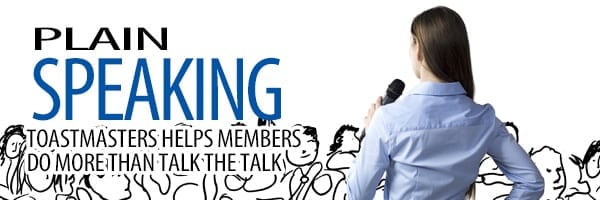
Plain Speaking
Toastmasters Helps Members Do More Than Talk the Talk
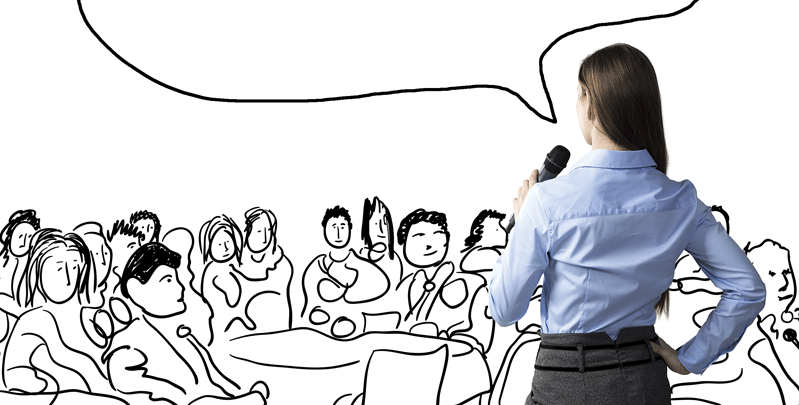 In her role as a credit analyst for TD Bank, Alicia Raymond spends most all of her time crunching numbers and helping to gauge risk. She’s not often interacting with clients or making presentations.
In her role as a credit analyst for TD Bank, Alicia Raymond spends most all of her time crunching numbers and helping to gauge risk. She’s not often interacting with clients or making presentations.
But with an eye toward the future, she knows that, to advance into commercial lending and one day have her own portfolio of clients, she must build confidence and improve her communication skills.
And those are the primary reasons why, nine months ago, she joined he downtown Springfield chapter of Toastmasters International, an organization that, as the name implies, has 313,000 members in 14,650 clubs in 126 countries around the world.
“I never felt comfortable doing it,” said Raymond, using that collective to describe the broad range of what would be considered public speaking. “It was something I knew I needed to work on if I wanted to advance.”
She first entered the room — in this case, a donated conference room at Cambridge College’s downtown facility in Tower Square — with curiosity and trepidation (more of the latter, to be sure), but soon found the group the group to be laid back, and that put her at ease.
Still, she remembers being quite nervous for her first two-minute speech, on a topic she can’t even remember. That’s because there have been so many since, and in the process of giving them and participating in a host of other exercises, including the regular ‘Table Talk’ sessions, during which random topics are discussed, she has greatly expanded her comfort zone when it comes to speaking in front of other people.
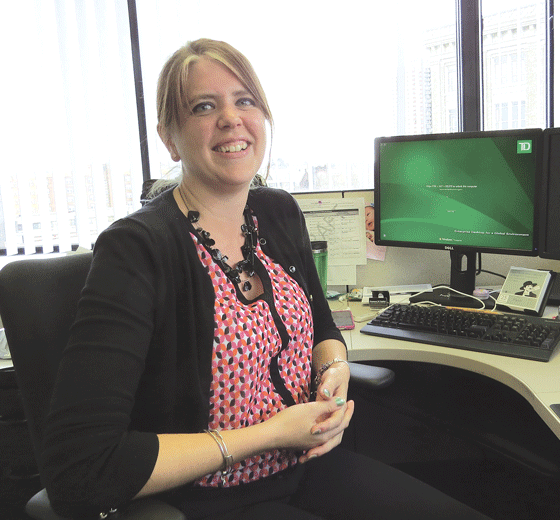
Alicia Raymond understood that she needed to gain confidence and improve her communication skills to advance, and has done both through Toastmasters.
In all of these respects — from the reasons for joining to first impressions to the results — Raymond is very typical of the people who find Toastmasters and often stay with the organization for years, if not decades, said Shera Cohen, who certainly speaks from experience.
Indeed, she had those same sentiments, fears, and emotions when she first attended a Toastmasters meeting nearly three decades ago, and she’s watched hundreds of others experience them as well.
“I didn’t give a speech for nine months after I joined — I could have given birth in the time it took to finally give one,” said Cohen, who heads up In the Spotlight, a nonprofit group that promotes the arts, and also leads the Springfield Armory Alliance, another nonprofit. “I was nervous about being judged and that I would not be coherent at all, and that I would use all those filler words like ‘um’ or ‘ah’ or ‘er,’ and that I wouldn’t sound professional.”
She eventually overcame all that with the help of a good mentor within the club, started with a short speech, worked toward longer ones, garnered invaluable repetition, and improved continuously.
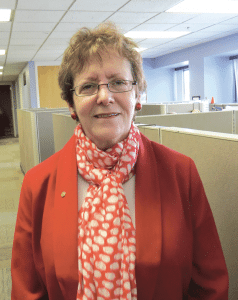
Shera Cohen says Toastmasters provides a positive environment where members can progress at their own pace.
Membership has brought a number of benefits for Sharon Gates, who owns a franchise of Conference Direct and assists clients of all sizes with finding sites for meetings and conferences. In that role, she’s making presentations to business owners and making pitches to prospective new clients — skills she was looking to improve, and has.
“I would say the difference is substantial,” she said when comparing things before she found the Springfield chapter through a web search three years ago and now. “Before I arrived, there was a lack of confidence with public speaking, and the nerves took over. Now, I’m much more in control; the more you do something, the more comfortable you get.”
For this issue, BusinessWest talked with several members of the Springfield chapter about how Toastmasters has helped them overcome what is widely considered one of society’s greatest fears — public speaking is right up there with flying, death, heights, the dark, failure, rejection, and spiders — and gain needed self-confidence along the way.
Speaking Up
Ellen Freyman has been a practicing attorney for more than 30 years. She focuses primarily on real-estate and business law, which means she spends almost all her time at her desk or at the Registry of Deeds, rather than in the courtroom.
But when she’s not at work, she’s active with one of many groups she supports in various ways, including the Affiliated Chambers of Commerce of Greater Springfield, which she currently serves as board chairman.
When she took on that responsibility, she understood that it would place her behind the podium — not often, but enough. And not for major policy speeches, certainly, but for general remarks, such as welcoming an audience, introducing a speaker, or kicking off a program.
She knew she could do all those things, but also knew she wanted, and needed, to do them better, and especially without the prepared notes that made her remarks seem, well, scripted, which they were.
That’s the primary reason why, even though she’s probably less than a decade from retirement, she chose to join the Springfield chapter of Toastmasters, and why she’s going to make a strong commitment to improving her recent attendance at meetings; she wants to get better and become more comfortable behind a microphone, and when speaking in general.
“Every time I speak in front of people, I need to use a script, and I’d love to be able to be more extemporaneous,” she said, noting one specific goal. “Overall, I want to feel comfortable — and more confident — when I’m up there talking.”
This is a common theme among those who join Toastmasters, said Cohen, adding that the Springfield chapter is one of three public groups regionally — the others are in Northampton and East Longmeadow — along with several private chapters at MassMutual.
There is a one-time entry fee of $20, she said, adding that annual dues are $48, with that money going toward rent, advertising, manuals, and local, regional, national, and international competitions, among other expenses.
Membership in the downtown Springfield chapter is capped at 20, and it is around that number now, she said, adding that individuals join at all ages, represent a wide range of professions, and arrive with a singular goal of controlling and overcoming their fear of public speaking.
This is accomplished through a very structured format designed to ease people into speaking in front of others, she noted, adding that all meetings unfold in a similar fashion.
There are generally one or two formal speeches given each session, she said, adding that members progress through a series of speeches carefully outlined by Toastmasters International, starting with shorter ones and progressing to longer, more involved talks — and always at the member’s pace.
“We don’t rush people,” Cohen said, recalling her own hesitation with giving a speech. “When they’re ready, they’re ready.”
While some members give speeches, others handle a variety of other roles, including timing the speech, counting the ‘ums’ and related words, and providing feedback.
This last individual, the ‘designated evaluator,’ is coached to provide positive feedback, with the accent on positive, to help build confidence, not shatter it.
“Everything is done kindly — we start with something good to say, and we end with something good to say; we clap all the time,” Cohen explained, adding that feedback is offered to address everything from body language to the smoothness of the delivery, all with the goal of helping the speaker improve.
“We give the results at the end … some people might not want to know, but others want to know exactly how they did,” she said. “I say ‘so’ a lot, so I want to know how many time I say that word.
“People gradually get into it, and it really helps when there’s a mentor, whether a formal one or an informal one,” she went on. “Toastmasters encourage the experienced members to help the newbie; I had a mentor whom I didn’t ask for; he was a little tough on me. But it worked — he encouraged me.”
Each meeting also features a segment called Table Topics, which, as the name suggests, involves a topic — almost anything except politics or religion — discussed around the table.
People don’t know what the topic is until they hear it, said Cohen, adding that it could involve a current event, an upcoming holiday, asking someone to comment on their favorite vacation, or another topic that could generate a wide range of responses and encourage participants to think quickly.
“Some of the topics are really simple, like, ‘what are you going to do for Easter?’” she explained. “But the ones that ask you to think a little more are interesting; some of the answers are funny, and some are very serious.”
The Subject at Hand
These Table Talk sessions have been particularly helpful for Dave Malloy, client services manager for United Personnel in Springfield. In that role, he handles everything from client retention to improving the recruiting pool, and is often interacting with the many types of clients the company has.
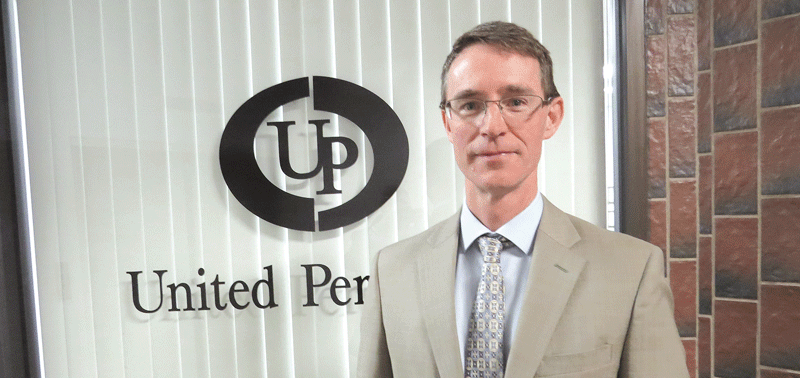
Dave Malloy says Toastmasters has helped him most with extemporaneous speaking — getting him to think quickly on his feet.
He’s been involved with Toastmasters since 2008, or roughly since he discovered that what he needed to improve his communication skills and ability to organize thoughts was repetition, something this organization provides in large quantities.
“What I first thought about Toastmasters was, ‘this will help me give presentations in public to 20 people, 50 people, or more — and that’s certainly something that someone can work on and polish,” he said. “But where it’s really helped for me is with Table Topics, which is more devoted to spontaneous speaking, or extemporaneous speaking, as opposed to having prepared comments.
“To me, that’s where I find more value, because it’s allowed me to be better in my work in terms of being more responsive to people,” he went on. “In the old days, when someone would come up to me at work and they’d have a question, I would feel like I’d have to go back to my desk, research things, and figure out what my answer is. Through Toastmasters, when someone asks me a question, I feel more comfortable, and I can draw from the knowledge I possess more readily, and I think that’s from practice.”
All that practice has made him a better, more valuable employee, he told BusinessWest, because he’s more efficient and can respond to people more quickly and effectively.
“That’s what comes from having to respond and comment on a topic when, a minute earlier, you didn’t know what that topic would be,” he continued. “It teaches you to think on your feet — and where else do you get the chance to practice that?”
Gates agreed, adding that, above all else, Toastmasters has provided her with needed self-confidence she’s gained through various speeches, but also from those spontaneous speaking exercises.
“I pushed myself to attend the meetings, number one, and when I attend, I do some speaking, whether it’s a short speech or Table Topics,” she explained. “And that really pushed me to get in front of an audience, get the feedback, and get the repetition, which has allowed me to be much more comfortable.
“So much so,” she went on, “that I recently gave a presentation to 200 people. I was a little nervous, of course, but it was fine. I was in control, where in the past, I would not have felt in control.”
Raymond can’t speak with as much experience, but she uses very similar language to describe how the group is helping her with a recognized need.
“I’m still nervous when I get up in front of people, but it’s a much more manageable level of nerves,” she explained. “I’ve become less reluctant to get in front of groups — I have the confidence that now I can do this, whereas before I started, when someone said, ‘we need someone to present for such and such,’ I would say, ‘pick someone else — not me, not me, not me!’”
Getting the Last Word
Malloy told BusinessWest that, although he’s been part of Toastmasters for eight years, he’s never considered his work with that group anywhere near done, because he needs to keep getting those reps he described as so valuable to his work and career.
“I will always need this. I know what the stats are — 98% of the public is afraid of speaking in public, or something like that; whatever it is, it’s a very large number,” he said. “I’m one of those people, and I’ll never not be one of those people. But what Toastmasters allows me to do is take this part of who I am and work on it.”
With that, he spoke for all those whose goal it is to speak more clearly and more effectively.
George O’Brien can be reached at [email protected]




